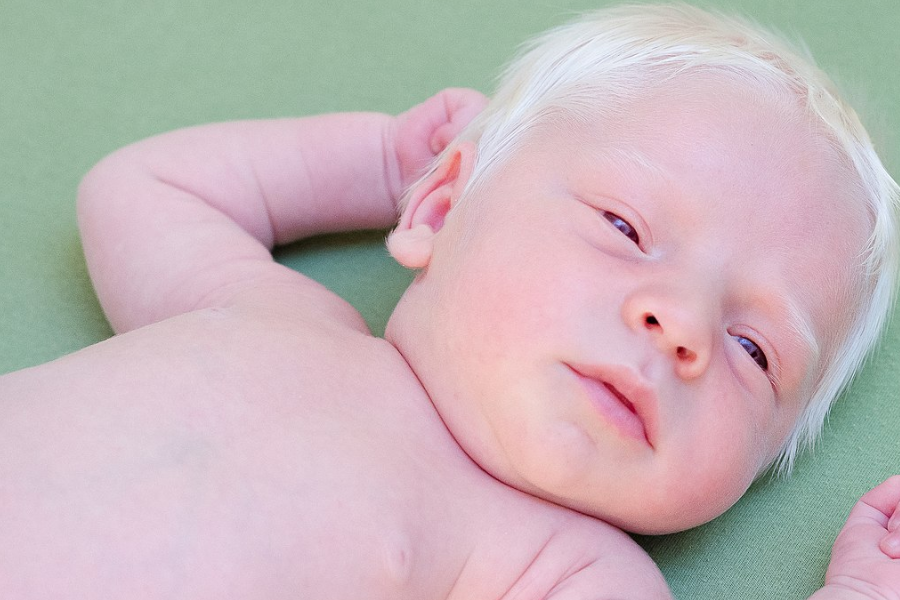
Albinism In Babies: What Are The Causes And Symptoms?
13 Jun 2023 | 3 min Read
Manisha Pradhan
Author | 1053 Articles
Albinism in babies is a rare genetic condition that affects the production of melanin, the pigment responsible for hair, skin, and eye colour.
Here are some of the causes of albinism in babies, and its implications.
What Is Albinism?
Albinism is an inherited condition caused by a lack or reduction of melanin in the body. Melanin is the pigment that provides colour to the skin, hair, and eyes. Babies with albinism typically have very light or white hair, pale skin, and light-coloured eyes.
Around 1 in 17,000 individuals worldwide have some form of albinism.
Albinism In Babies: What Are The Causes?
Albinism is most commonly caused by genetic mutations that affect the production or function of melanin. These mutations can be inherited from one or both parents who carry the gene. There are different types of albinism caused by specific genetic variations, including:
- Oculocutaneous Albinism (OCA)
- Ocular Albinism (OA)
In OCA, mutations occur in genes that are involved in the production of melanin. This leads to a decrease or absence of melanin in the skin, hair, and eyes. OA, on the other hand, is caused by mutations in genes that affect the development of the eyes and optic nerve.
What Are The Symptoms Of Albinism In Babies?

Babies with albinism may experience the following symptoms:
- Crossed eyes (strabismus)
- Rapid eye movements (nystagmus)
- Very pale skin, hair and eyes
- Light sensitivity (photophobia)
- Vision problems
Parents of babies with albinism need to take extra precautions to safeguard their baby’s skin, such as:
- Applying sunscreen
- Providing protective clothing
- Ensuring adequate shade
Moreover, albinism can affect visual acuity and depth perception due to the underdevelopment of the retina and abnormal routing of the optic nerves. This can result in reduced visual sharpness, sensitivity to glare, and difficulties with depth perception. Regular eye examinations and appropriate visual aids, such as prescription glasses or contact lenses, can help mitigate these challenges and improve the child’s visual abilities.
What Are The Risks Of Albinism In Babies?
Since babies with albinism lack melanin in their skin, they’re at increased risk of getting skin cancer and sunburn. Look out for skin changes, such as:
- Growth or lump
- Moles
- Freckles
- Patches of skin that change in size, shape or colour
If you spot any of these signs on your baby’s skin, it is important to consult a doctor immediately skin cancer is easier to treat if diagnosed earlier.
FAQs
Can albinism be prevented?
Albinism is an inherited condition and cannot be prevented. But people who have a family history of albinism can consider genetic counselling.
Can babies with albinism live a normal life?
Yes, babies with albinism can lead normal, healthy lives. But parents need to limit the amount of time they spend outdoors and protect them from sun exposure.
Albinism in babies is a rare genetic condition and understanding the causes and symptoms of albinism can help parents, provide appropriate precautions, regular medical care and emotional support to their babies to help them lead normal and healthy lives.
Recommended skincare products for babies
Also Read:
Umbilical Hernia In Babies: Does it need treatment?
Dimples In Babies: Why Do Some Have Them While Some Don’t?
Cover image source: encrypted-tbn0.gstatic.com
A


Related Topics for you
Suggestions offered by doctors on BabyChakra are of advisory nature i.e., for educational and informational purposes only. Content posted on, created for, or compiled by BabyChakra is not intended or designed to replace your doctor's independent judgment about any symptom, condition, or the appropriateness or risks of a procedure or treatment for a given person.



